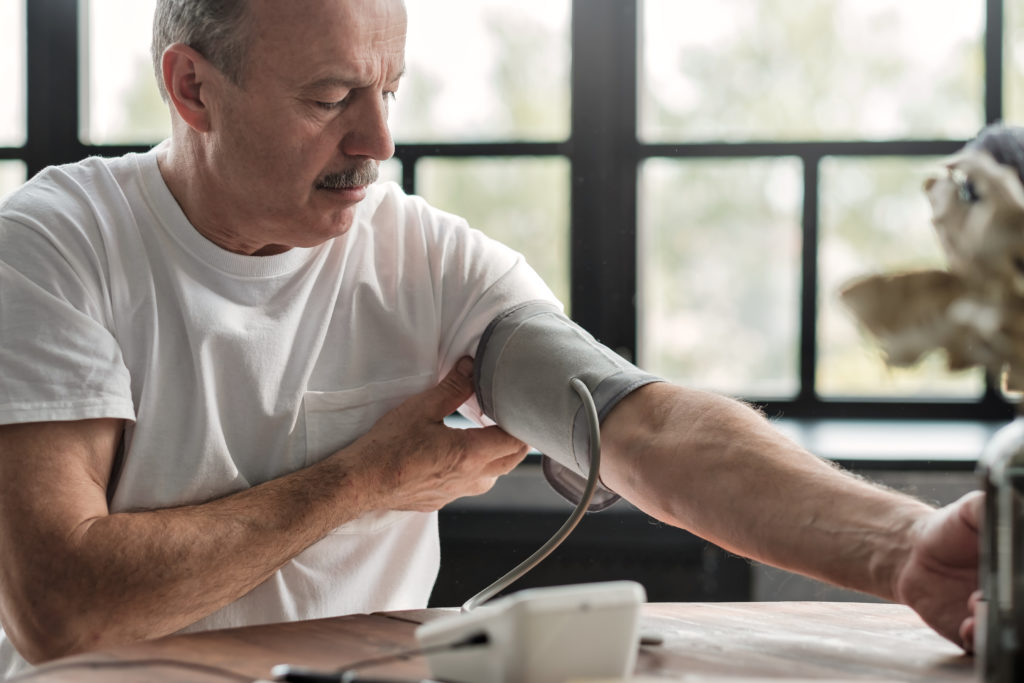August 31, 2022
Why is My Blood Pressure High in the Morning?
High blood pressure is a condition that causes the force of the blood in your body to press against the walls of your blood vessels at too high of a rate. When you get your blood pressure read, it can be deemed as high if the top number reads anything over 129 mm Hg (known as systolic or force of blood pumping out of the heart and into the arteries) and the lower number (known as diastolic or the rate of the heart rests in between beats) reads anything over 79 mm Hg.
The Food and Drug Administration estimates that one in three American adults live with high blood pressure. High blood pressure has been deemed the world’s leading preventable cause of death.
Morning time can be dangerous for people living with high blood pressure. Studies have shown that blood pressure can increase the most in the morning time, which can lead to a higher likelihood of cardiac events.
Follow along to learn about the causes, who is at risk, treatment options, and more.
What Causes High Blood Pressure in the Morning?
Every person has a circadian rhythm, which is a 24-hour cycle that regulates the sleep-wake cycle. Morning hours are usually when a person wakes. Upon waking, the body (particularly the nervous system) releases different chemicals, like adrenaline and cortisol, to give you energy and jumpstart your day. Though beneficial, these chemicals can cause a natural increase in blood pressure, which puts people that live with high blood pressure at an increased risk for complications.
There are two types of high blood pressure in the morning. The first one is nocturnal hypertension. Nocturnal hypertension is high blood pressure that extends from nighttime to morning time. The second is morning surge hypertension. Morning surge hypertension is blood pressure that increases in the morning.
High blood pressure in the morning has been linked to organ damage to the brain, heart, and kidneys. It has also been linked to causing silent strokes, heart attacks, and other cardiovascular complications.
Who is at Risk for Morning Hypertension?
Populations at higher risk of developing complications related to high blood pressure include the following: 7
- South American.
- European.
- Asian.
- Elderly.
Certain medical conditions placed people at risk for experiencing high blood pressure in the morning. These conditions included the following:
- Diabetes (a condition affecting blood sugar).

- Hypertension (high blood pressure).
- Dyslipidemia (elevated cholesterol or lipids in the blood).
- Sleep apnea (a condition where breathing starts and stops in sleep).
- Glucose abnormality.
- Metabolic syndrome (multiple conditions that affect heart health).
- Insomnia or poor sleep quality.
- Nocturnal Hypoxia (low oxygen at night).
High blood pressure in the morning was also found to be more prevalent based on certain environmental factors.
- High salt intake.
- Winter time or cold outside temp.
- High levels of physical activity upon waking.
- High-stress levels.
- Smoking.
- Increased alcohol consumption.
When Should You Measure Your Blood Pressure?
If possible, it would be best to take your blood pressure twice a day. Morning and evening times can help you get an understanding of your risk for high blood pressure in the morning. Whenever you choose to do it, make sure you’re taking it at the same time every day.
How Should You Measure Your Blood Pressure?
When taking your blood pressure, it’s essential to refrain from any activities that could increase your blood pressure 30 minutes before you plan to take it. These activities may include smoking, exercise, or drinking caffeine. It would also be helpful to use the bathroom and sit still and be silent five minutes beforehand.
Make sure you’re sitting down with your back straight. Ideally, it would be best to sit against a hard surface like a dining room chair to help maintain your posture. Do not cross your arms and legs; they should be supported by a flat surface.
Place your upper arm at the same level as your heart with the end of the cuff above the bend of your elbow. Follow the instructions that came with your blood pressure machine. It may be best to take a reading more than once a minute apart to get an accurate number.
Treatment Options for Morning Hypertension
There are various treatment options available for high blood pressure in the morning.
Some of these methods include the following:
- Long-acting blood pressure medication: can control blood pressure longer than 24 hours to keep blood pressure rate at a healthy level.
- Taking the maximum or full dose of blood pressure medications.
- Combination therapy: taking more than one blood pressure medication to increase the efficiency of the drug.
Always consult with your doctor about which treatment options may be right for you when treating high blood pressure in the morning. Collaborating with your doctor to create a medication treatment plan can be beneficial in managing blood pressure levels before they become a risk to your health.
Preventing High Blood Pressure in the Morning
Prevention can be just as important as treatment. Prevention allows you to get ahead of the issue before it becomes a problem. There are many different steps you can take to prevent high blood pressure in the morning.
These steps include the following:
- Eat healthy foods: Eating healthy foods can reduce your salt intake and improve your overall health.

- Limit alcohol consumption.
- Keep up with your medication management plan for high blood pressure and other health concerns.
- Attend doctor’s appointments regularly.
- Reduce stress levels.
- Refrain from smoking.
- Don’t drink caffeine.
- Exercise in the evening instead of in the morning.
- Follow the advice from your doctor.
Healthcare Associates of Texas is made up of board-certified primary care and internal medicine doctors who can help you identify the cause of morning high blood pressure. Find a location close to you.
DISCLAIMER
The information featured in this site is general in nature. The site provides health information designed to complement your personal health management. It does not provide medical advice or health services and is not meant to replace professional advice or imply coverage of specific clinical services or products. The inclusion of links to other web sites does not imply any endorsement of the material on such websites.